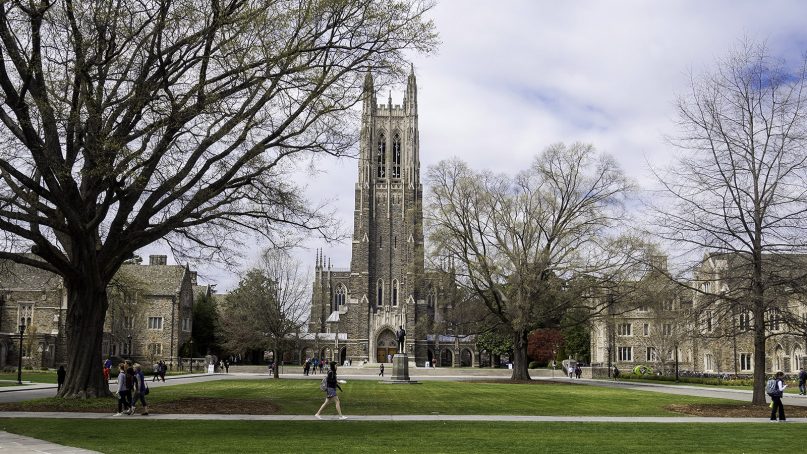DURHAM, N.C. (RNS) — As most of the Duke University community was glued to the basketball team’s march to the NCAA Final Four last week, a debate erupted on campus inflamed by months of feuding between two student groups — and a student government caught in the middle.
At a March 16 student government meeting, the campus chapter of Students for Justice in Palestine requested $16,000 to fund two events keynoted by three Palestinian activists, according to The Chronicle, the campus daily. The funding was approved, despite strong pushback from Israel supporters at Duke, who said at least one of the speakers has made inflammatory comments that crossed the line into antisemitism.
During the funding debate, Alex Dray, a student senator, quoted a passage from “Rifqa,” a book by Mohammed El-Kurd, one of the invited Palestinian speakers, in which El-Kurd wrote that Israelis “harvest organs of the martyred” Palestinians and “feed their warriors our own.”
Nicole Rosenzweig, another senator, quoted a tweet from El-Kurd stating that Zionists have “an unquenchable thirst for Palestinian blood,” which she said raised the infamous blood libel.
A member of SJP, who asked The Chronicle not to be quoted by name because of fear of online harassment, defended the invitation. He told the campus daily that “the (requested) honorarium and invitation to speak are by no means an endorsement of everything the speaker has or ever will say.”
The funding request was approved by the student government despite what appeared to be the lack of a required quorum.
For months leading up to the latest fight, the local Duke chapters of Students for Justice in Palestine and a new group, Students Supporting Israel, have been in a virtual slugfest on the campus.
On Nov. 15, 2021, members of SJP challenged university funding for Students Supporting Israel, citing a response by SSI to a tweet critical of Israel. The tweet, posted by a Duke sophomore named Elyana Riddick, was in response to The Chronicle’s article about Duke Student Government’s initial recognition of SSI and was captioned “My school promotes settler colonialism.” SSI then circulated a screenshot of the tweet.
SSI replied with an Instagram to Riddick: “Please allow us to educate you on what ‘settler colonialism’ actually is and why Israel does not fall under this category whatsoever. These types of narratives are what we strive to combat and condemn, which is why Duke’s chapter of Students Supporting Israel has been officially established & is here to stay.”

Students for Justice in Palestine logo. Courtesy image
SJP charged that the reply violated student government policy prohibiting inappropriate social media conduct and called on Duke’s student government president, Christina Wang, to veto recognition and support of SSI as a Duke student organization.
Wang agreed, joining a unanimous vote by members of the student government’s executive board. She ruled the SSI post was “evidence that the group singled out an individual student on their organization’s social media account in a way that was unacceptable for any student group and appeared antithetical to the group’s stated mission to be welcoming and inclusive to all Duke students, and educational in mission and purpose.”
A brouhaha ensued in the Jewish American press and abroad, as well as in some Arab and Muslim media. Locally, however, the most furious debate was largely confined to social media between those immediately involved.
Wang became the object of a racist doxxing campaign, which she recounted in a column in The Chronicle.
“I was called racist and told to go back to China, to take my communist, coronavirus-bearing self back to where I belong,” she wrote, adding that she was branded an antisemitic Hitler lover and a communist, among more vulgar names.
In the end, she wrote, she was lucky to be able to rely on friends and classmates, family members and her “very loving and supportive Jewish … boyfriend and his incredible family.”
But the larger blowback, a firestorm of mostly national and international backlash, was so severe that Duke University President Vincent Price and Provost Sally Kornbluth issued a statement aimed at damage control, saying, in part:
“The actions of Duke Student Government are independent of, and not determined by or sanctioned by, the university. Nor does a lack of formal recognition by student government prevent students from organizing in groups as they wish; there are many organizations that continue to operate at Duke in different ways without such recognition, and the university has identified options for SSI to secure financial and programmatic support.”
University administrators took no official action, however, and did not intervene beyond the statement. Instead, they — or their representatives — began a stealth lobbying effort to get the student senate to reverse its decision.
Without directly addressing the SSI issue, the leaders of the Freeman Center for Jewish Life at Duke appeared before the student senate on Jan. 26 for a presentation on the history and nature of antisemitism.
Duke Hillel Executive Director Joyce Gordon and campus Jewish chaplain Rabbi Elana Friedman gave a comprehensive presentation, including three videos, two historic and one contemporary. They led a discussion of the connection between white supremacy and antisemitism. However, according to The Chronicle, Gordon insisted that “This is about anti-Semitism, a big topic, not about any particular position of the student government at any time,” a veiled reference to the student government’s November veto of the Duke Students Supporting Israel sponsorship.
After the presentation, Duke Student Government unanimously passed a resolution expressing support for the International Holocaust Remembrance Alliance’s working definition of antisemitism. Senators subsequently attended a training session on recognizing antisemitism.
In February, the student senate quietly reversed itself and chartered SSI, the pro-Israel group.
Predictably, last week’s episode involving the invitation to the three Palestinian speakers set off a new round of charges by Duke Israel supporters, including but not confined to letters to the editor and columns in The Chronicle.
In a widely circulated email, Dr. Robert Gutman, a retired medical school faculty member, wrote facetiously: “All who still believe that anti-Semitism is not on the Duke campus, raise your hand.”
Marc Zvi Brettler, Bernice and Morton Lerner Professor of Jewish Studies in Duke’s department of religious studies, said that if these Palestinians speak on the Duke campus, “and indeed do spew out lies, especially if they border on antisemitism, I hope that President (Vincent) Price will again speak out.”





